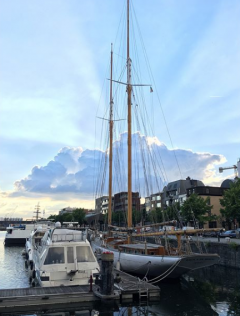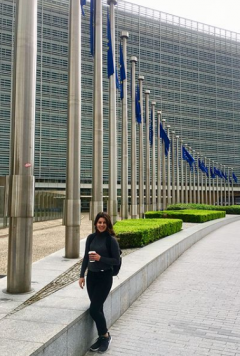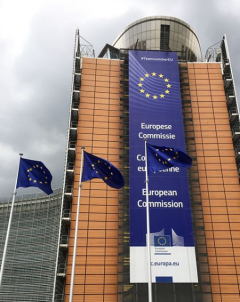


My internship was completed from May 7 – June 30, 2018 with the Faculty of Social Sciences at the University of Antwerp. While the formalities of my internship were handled by ACTORE, I worked under the supervision of two members from the Department of Political Science: Dr. Petra Meier and Dr. Petra Ahrens. I was able to meet with each of them during my second week of stay and receive some feedback and direction on the research proposal and draft chapter I submitted for my Major Research Project (MRP) during the winter semester.
Dr. Meier has a background in equality and diversity studies within Europe. What I found most useful was her expertise in the inclusiveness and gendering of public policies, especially through their gender impact assessment and discursive practices. Dr. Meier’s major critique of my proposal was that it would be too large of a project to analyze not only whether the Government of Sweden applied an intersectional approach to the cash-for-care policy, but also if there was a norms diffusion of this intersectional approach from the European Union (EU) to Swedish policymakers. We broke down the larger project into two potential smaller projects as to better manage and set realistic expectations for my MRP. During our next meeting, after I had time to read and consider the literature, we mapped out what a research plan for each of the two options would look like.
A significant contribution that Dr. Meier offered to my project was her expertise on critical frame analysis. While common in policy research, this approach was new to me, and I had little familiarity with how I would go about using a critical frame analysis to answer my research question. The book she co-authored with Emanuela Lombardo, “Multiple Meanings of Gender Equality: A critical frame analysis if gender policies in Europe,” provided a good base for me to read the theory and possible approaches for me to use in my MRP. As Director of the Policy Research Centre on Equality Policies, Dr. Meier was able to offer the resources I needed to develop my project. She further supported me in offering to help publish my work once I complete my graduate studies at Carleton University.
I was especially fortunate to have Dr. Petra Ahrens overlap as a visiting scholar at the University of Antwerp during my stay. While Dr. Meier offered a broad expertise in gender policies across Europe, Dr. Ahrens was able to focus the details of my project involving the EU. Her familiarity with the gender policies and gender mainstreaming enabled me to shortlist relevant scholars I should include in my literature review. What I found especially useful was her familiarity with committees within the EU, as she was able to pinpoint where I could find relevant reports and resolutions on gender equality and family policies. Beyond supporting me in Antwerp, Dr. Ahrens too extended an invitation to supervise my project further should I pursue another research grant at Humboldt University in Berlin.
Having lived in Belgium prior to this internship and visited Antwerp twice before, I had a fairly good grasp on what day-to-day life would be like. Culturally speaking, Belgium shares many western comforts that Canadians are accustomed to. While it would have been easier for me to live in a French-speaking part of Belgium, overall I had few communication barriers between both my interlocutors understanding English and through using Google Translate as an aid. The price of living in Belgium is similar to Ottawa, although groceries were on average more expensive (save for cheese and beer purchases). While student housing is affordable and readily available for those beginning studies in September and continuing for the year, I had to pay a premium for my two month stay. I sought alternative housing options through the university and local ads, using my Belgian friend as a resource for translating and navigating rental websites. However, Air BnB was the only practical choice for my short-term stay. My Belgian counterparts at the university confirmed that while $1,100 a month I paid was expensive for a student apartment, they too were unaware of short-term options with better value.
The University of Antwerp and ACTORE in particular exceeded my expectations with the facilities they provided. The shared office space I was offered with fellow PhD students was an excellent space to get work done while being social during lunches and breaks. The administrative staff was among some of the most organized I have seen throughout my study abroad experiences; they were quick to answer questions and make my logistical needs a priority. Dr. Dirk De Bièvre and Dr. Peter Bursens from the Jean-Monnet Canada-EU Network were especially friendly and accommodating, welcoming me to come ask them questions and seek assistance if ever I required.
One downside to the internship was that being the sole new student from Canada, I found it difficult to integrate with the other graduate students. While we were friendly at the university, I did not have anyone to engage with socially outside of working hours. This is something that I was expecting and prepared for, so I was able to make the most of my time in Belgium by travelling on some weekends and going to museums and cultural events alone. However, the fact that the internship is largely a solo experience might be something to highlight to future applicants. A benefit with being based in Antwerp was the access I had to EU related events both locally and in Brussels. During my tenure, I travelled to Brussels three times to attend lectures and special events. One highlight was spending a day with the EU Study Tour & Internship Program after reaching out to Dr. Conrad King. As I am interested in a future working in diplomacy, it was a positive experience for me to visit the Canadian Mission to the EU in Brussels again, after I was on the study tour in 2015. In Antwerp, I enjoyed my involvement with the Jean Monnet Canada-EU Network Workshop on “CETA and Progressive Trade Agreements: What it Means for the EU and Canada” hosted by ACTORE.
Overall, my experience in Belgium was beneficial not only academically, but personally as well. I appreciated the opportunity to focus and narrow my research project while immersed in another culture. After spending two months at the University of Antwerp, I have become more confident moving forward with my graduate research at Carleton University and am eager to pursue future research opportunities as I continue my academic career.